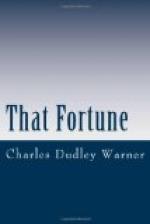The boy lived in these traditions quite as much as in those of the Revolutionary War into which they invariably glided in his perspective of history, the redskins and the redcoats being both enemies of his ancestors. There was the grave of the envied Phineas Arms—that ancient boy not much older than he—and there were hanging in the kitchen the musket and powder-horn that his great-grandfather had carried at Bunker Hill, and did he not know by heart the story of his great-grandmother, who used to tell his father that she heard when she was a slip of a girl in Plymouth the cannonading on that awful day when Gage met his victorious defeat?
In fact, according to his history-book there had been little but wars in this peaceful nation: the War of 1812, the Mexican War, the incessant frontier wars with the Indians, the Kansas War, the Mormon War, the War for the Union. The echoes of the latter had not yet died away. What a career he might have had if he had not been born so late in the world! Swinging in this tree-top, with a vivid consciousness of life, of his own capacity for action, it seemed a pity that he could not follow the drum and the flag into such contests as he read about so eagerly.
And yet this was only a corner of the boy’s imagination. He had many worlds and he lived in each by turn. There was the world of the Old Testament, of David and Samson, and of those dim figures in the dawn of history, called the Patriarchs. There was the world of Julius Caesar and the Latin grammar, though this was scarcely as real to him as the Old Testament, which was brought to his notice every Sunday as a necessity of his life, while Caesar and AEneas and the fourth declension were made to be a task, for some mysterious reason, a part of his education. He had not been told that they were really a part of the other world which occupied his mind so much of the time, the world of the Arabian Nights and Robinson Crusoe, and Coleridge and Shelley and Longfellow, and Washington Irving and Scott and Thackeray, and Pope’s Iliad and Plutarch’s Lives. That this was a living world to the boy was scarcely his fault, for it must be confessed that those were very antiquated book-shelves in the old farmhouse to which he had access, and the news had not been apprehended in this remote valley that the classics of literature were all as good as dead and buried, and that the human mind had not really created anything worth modern notice before about the middle of the nineteenth century. It was not exactly an ignorant valley, for the daily newspapers were there, and the monthly magazine, and the fashion-plate of Paris, and the illuminating sunshine of new science, and enough of the uneasy throb of modern life. Yet somehow the books that were still books had not been sent to the garret, to make room for the illustrated papers and the profound physiological studies of sin and suffering that were produced by touching a scientific button. No, the boy was conscious in a way of the mighty pulsation of American life, and he had also a dim notion that his dreams in his various worlds would come to a brilliant fulfillment when he was big enough to go out and win a name and fame. But somehow the old books, and the family life, and the sedate ways of the community he knew, had given him a fundamental and not unarmed faith in the things that were and had been.




